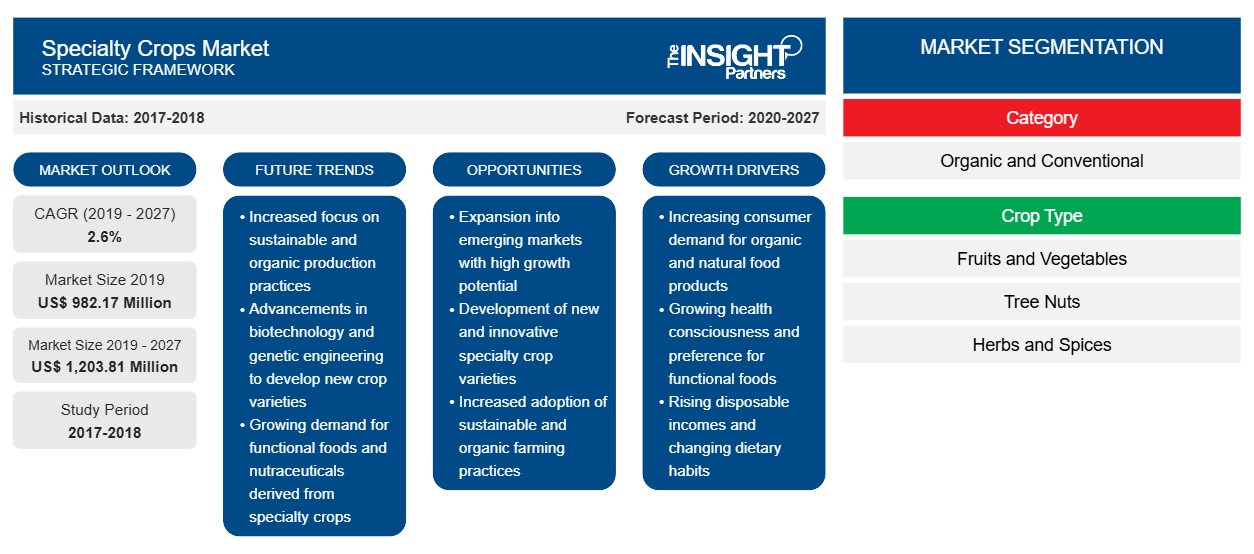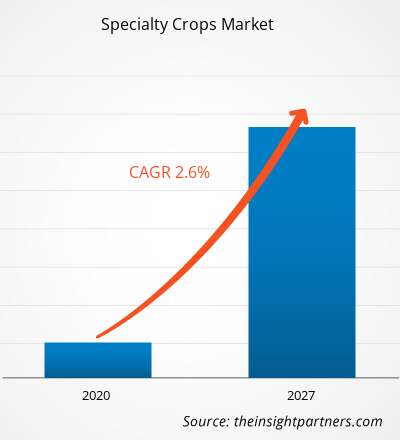The specialty crops market was valued at US$ 982.17 million in 2019 and is projected to reach US$ 1,203.81 million by 2027; it is expected to grow at a CAGR of 2.6% from 2020 to 2027.
Specialty crops refer to fruits and vegetables, tree nuts, dried fruits, horticulture, and nursery crops (including floriculture). They also include exotic crops that are specifically cultivated across a region due to climatic and topographical features. With the growing population, coupled with rise in per capita disposable income, a paradigm shift in consumer eating patterns have been observed, which has a direct impact on the demand for healthy and tasty food. Further, rapid urbanization, ethnic composition, health concerns, and changes in demographic features are other factors promoting the demand for specialty crops. The widening application scope of specialty crops, supportive government measures, and free trade policies are the key factors driving the specialty crops market. However, the environmental and trade barriers restrict the growth of the specialty crops market.
In 2019, Asia Pacific held the largest share of the global specialty crops market. The region comprises several emerging countries, and owing to rising disposable income of the populace, the lifestyle of consumers is changing rapidly. Moreover, the influence of western lifestyle and rapid urbanization is propelling the growth of convenience foods in this region. Customers in the region are highly attracted to plant-based food products, which is further leading to the growth of the specialty crops market. In order to attain an optimum market share, companies in the region are implementing various technologies. For instance, companies in China are using accelerated ripening storage to satisfy market demand. Accelerated ripening guarantees the same color, smell, and taste similar to that of naturally ripened fruits. Many players have started to acknowledge the necessity and importance of accelerated ripening and have established accelerated ripening warehouses.
COVID-19 first began in Wuhan, China in December 2019, and since then, it has spread across the globe. As of February 2021, the US, India, Brazil, Russia, the UK, France, Spain, Italy, Turkey, Germany, Colombia, and Argentina are some of the worst affected countries in terms of confirmed cases and reported deaths. According to the latest WHO figures, there are ~102,584,351 confirmed cases and ~2,222,647 total deaths globally. The coronavirus outbreak has affected economies and industries in various countries due to lockdowns, travel bans, and business shutdowns. The agriculture industry is one of the major industries suffering serious disruptions, such as supply chain breaks, technology event cancellations, and office shutdowns, as a result of this outbreak. The shutdown of various plants and factories in North America, Europe, Asia Pacific, South America, and the Middle East & Africa has affected the global supply chain and negatively impacted the manufacturing, delivery schedules, and sales of various goods.
The specialty crops market has been growing consistently over the last decade. However, the onset of the COVID-19 pandemic introduced unique challenges to the industry, which threatened its continued growth. Hence, various governments are offering support for the specialty crop farmers to regain the market momentum. For instance, as part of the Coronavirus Farm Assistance Program, the US Department of Agriculture (USDA) is providing vital financial support to producers of agricultural commodities who have suffered a 5% or more price decline or who had losses due to disruptions in market supply chain due to COVID-19. Thus, such favorable initiatives by the government are estimated to help the specialty crop market players.
Customize This Report To Suit Your Requirement
You will get customization on any report - free of charge - including parts of this report, or country-level analysis, Excel Data pack, as well as avail great offers and discounts for start-ups & universities
Specialty Crops Market: Strategic Insights

-
Get Top Key Market Trends of this report.This FREE sample will include data analysis, ranging from market trends to estimates and forecasts.
Market Insights
Supportive Government Measures and Free Trade Policies
The growth of specialty crops is strongly supported by positive government initiatives, which include sales and marketing activities, plant pest and disease prevention, and research & development. For instance, the farm bill passed in 2018 (Agriculture Improvement Act of 2018) aimed at reauthorizing and extending current programs to promote the growth of several specialty crops, such as fruits and vegetables, tree nuts, and nursery products. The farm bill was implemented to offer support to specialty crop producers through Specialty Crop Block Grant Program and the Specialty Crops market News. Through such programs, USDA focuses on improving competitiveness and providing support in marketing, pest management, research, and food safety. The bill also acknowledges several trade issues revolving around specialty crops and offers technical as well as export assistance. Apart from this, a research institute—Specialty Crop Research Initiative (SCRI) has been formed with an intension to encourage collaboration, open communication, and exchange of information. In addition, government offered food assistance program to uplift specialty crop producers impacted by the COVID-19 pandemic. This assistance was offered to promote the growth of specialty crops, including horticulture, tree nuts, fruits and vegetables, and indigo. The USDA is reinforcing Coronavirus Food Assistance Program 2 for the producers suffering from market disruptions and fluctuations in prices. Further, in India, government has decided to offer 50% subsidies to poly or green house to promote the growth of nursery crops. Apart from government programs, free trade policies have also been implemented, which have significantly integrated supply chain processes resulting in effective trade activities with increased trade volumes and access to better quality, lower-priced goods.
Category Insights
Based on category, the global specialty crops market has been segmented into organic and conventional. The conventional segment led the global specialty crops market in 2019. Conventional farming is one of the most practiced farming methods that involve the use of synthetic fertilizers, pesticides, and other chemical compounds. The conventional farming technique is widely adopted among small and marginal farmers to obtain higher yield at a lower production cost. The technique runs in favor of the producers and cultivators as the yields are high in comparison to cost. Moreover, the lack of knowledge among farmers regarding the health and environmental benefits associated with organic farming is promoting the growth of the segment. However, there are several disadvantages related to this method. Crops cultivated using conventional methods contain chemical residues, due to the use of synthetic agrochemicals, which may be hazardous for animals and humans.
Crop Type Insights
In terms of crop type, the global specialty crops market is segmented into fruits and vegetables, tree nuts, herbs and spices, and others. The fruits and vegetables segment dominated the global specialty crops market in 2019. Fruits and vegetables constitute a significant part of agricultural production and they are extensively cultivated round the year for both commercial and household purposes. The global demand for fruits and vegetables is high owing to their high nutritional profile. Apart from direct domestic consumption, these crops find their application in diversified end-use industries. The USDA has defined and categorized different fruits in specialty crops, which include apple, avocado, banana, blackberry, blueberry, breadfruit, cacao, cherimoya, cherry, chokeberry, citrus, coconut, coffee, cranberry, currant, date, feijoa fruit, fig, gooseberry, grape (incl. raisin), guava, kiwi, litchi, macadamia, mango, nectarine, and olive. It has also categorized different vegetables as specialty crops, which include artichoke, asparagus, beet, broccoli, carrot, cauliflower, celeriac, celery, chickpeas, chive, collards, cucumber, edamame, eggplant, endive, pea (garden, dry, edible), garlic, horseradish, kohlrabi, leek, lentils, and lettuce. Owing to rising consumer awareness regarding the health benefits associated with organic produce, the demand for specialty fruits and vegetables grown organically is also increasing. Additionally, rapid urbanization and shift in consumer preference toward healthy lifestyle have encouraged the adoption of fruits and vegetables in their diet, thereby promoting the growth of the segment.
Mergers and acquisition and research & development are commonly adopted strategies by companies to expand their footprint worldwide, which is further impacting the size of the market. The players present in the specialty crops market are implementing mergers and acquisition and research & development strategies to enlarge the customer base and to gain significant market share across the world, which also permits the players to maintain their brand name globally.
Specialty Crops Market Regional InsightsThe regional trends and factors influencing the Specialty Crops Market throughout the forecast period have been thoroughly explained by the analysts at The Insight Partners. This section also discusses Specialty Crops Market segments and geography across North America, Europe, Asia Pacific, Middle East and Africa, and South and Central America.
Specialty Crops Market Report Scope
| Report Attribute | Details |
|---|---|
| Market size in 2019 | US$ 982.17 Million |
| Market Size by 2027 | US$ 1,203.81 Million |
| Global CAGR (2019 - 2027) | 2.6% |
| Historical Data | 2017-2018 |
| Forecast period | 2020-2027 |
| Segments Covered |
By Category
|
| Regions and Countries Covered |
North America
|
| Market leaders and key company profiles |
|
Specialty Crops Market Players Density: Understanding Its Impact on Business Dynamics
The Specialty Crops Market is growing rapidly, driven by increasing end-user demand due to factors such as evolving consumer preferences, technological advancements, and greater awareness of the product's benefits. As demand rises, businesses are expanding their offerings, innovating to meet consumer needs, and capitalizing on emerging trends, which further fuels market growth.

- Get the Specialty Crops Market top key players overview
Report Spotlights
- Progressive industry trends in the global specialty crops market to help players develop effective long-term strategies
- Business growth strategies adopted by developed and developing markets
- Quantitative analysis of the global specialty crops market from 2017 to 2027
- Estimation of global specialty crops demand across various industries
- PEST analysis to illustrate the efficacy of buyers and suppliers operating in the industry to predict the market growth
- Recent developments to understand the competitive market scenario and global specialty crops demand
- Market trends and outlook coupled with factors driving and restraining the growth of the global specialty crops market
- Decision-making process by understanding strategies that underpin commercial interest with regard to global specialty crops market growth
- Global specialty crops market size at various nodes of market
- Detailed overview and segmentation of the global specialty crops market, as well as its dynamics in the industry
- Global specialty crops market size in various regions with promising growth opportunities
Global Specialty Crops Market – by Category
- Organic
- Conventional
Global Specialty Crops Market – by Crop Type
- Fruits And Vegetables
- Tree Nuts
- Herbs And Spices
- Others
Company Profiles
- DIAMOND FRUIT CO.
- Harbor Spice Co., Inc.
- Olam International
- Oregon Spice Company
- The Specialty Crop Company
- BanaBay Limited
- Rice Fruit Company
- Fisher Nut Company
- Simped Foods Pty Ltd.
- SVZ Industrial Fruit & Vegetable Ingredients
Frequently Asked Questions
Based crop type, why is the fruits & vegetables segment expected to grow at the highest rate during 2020–2027?
Can you list some of the major players operating in the global specialty crop market?
Which region held the largest share of the global specialty crop market?
- Historical Analysis (2 Years), Base Year, Forecast (7 Years) with CAGR
- PEST and SWOT Analysis
- Market Size Value / Volume - Global, Regional, Country
- Industry and Competitive Landscape
- Excel Dataset
Recent Reports
Testimonials
Reason to Buy
- Informed Decision-Making
- Understanding Market Dynamics
- Competitive Analysis
- Identifying Emerging Markets
- Customer Insights
- Market Forecasts
- Risk Mitigation
- Boosting Operational Efficiency
- Strategic Planning
- Investment Justification
- Tracking Industry Innovations
- Aligning with Regulatory Trends





















 Get Free Sample For
Get Free Sample For